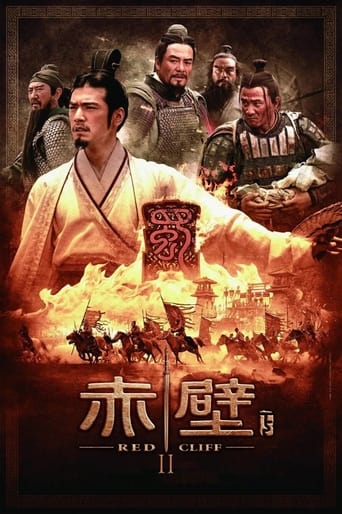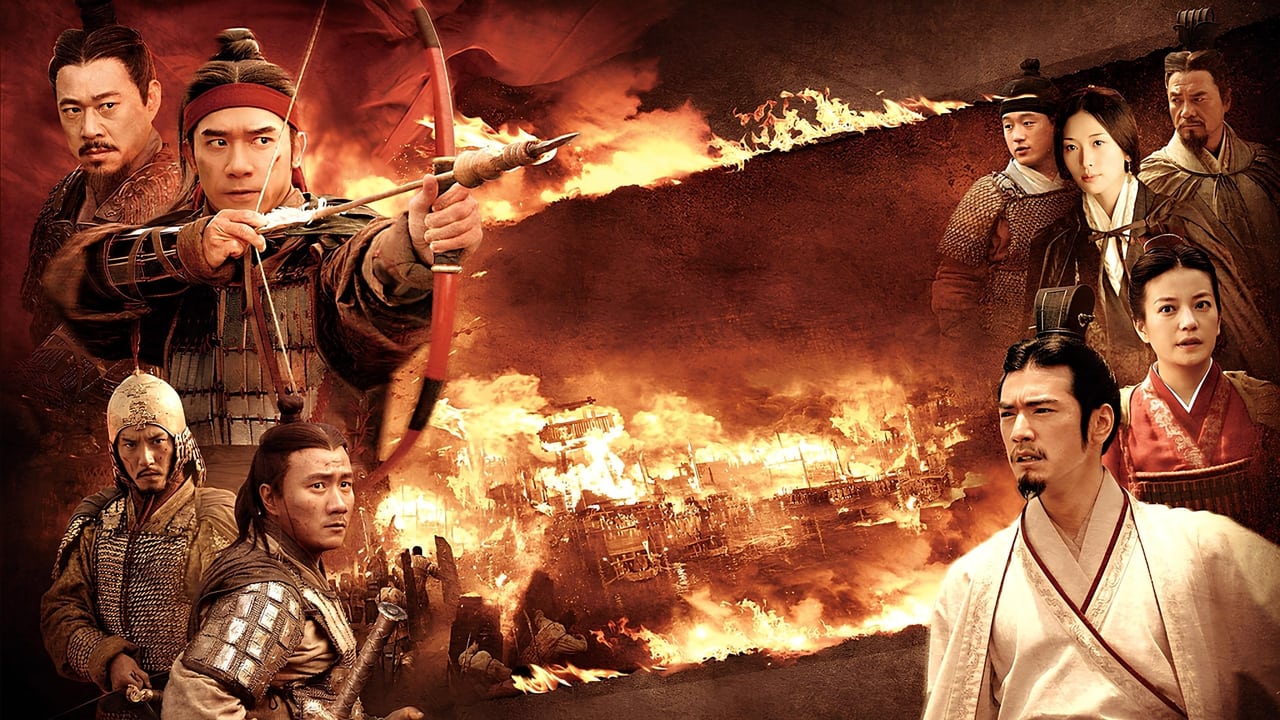ebiros2
The battle of the Red Cliff, which is the climax from the first half of "Romance of the Three Kingdom" by Luo Guanzhong is perhaps the most spectacular war story in all of Asia. Until the outbreak of Russo-Japanese war, it certainly was one of the biggest battle of the region, and perhaps the biggest in terms of numbers of people involved.Director John Woo assembled an international talent of actors to create this one of a kind epic movie. He's described it as 50% fictional, but he must have put lot of thoughts into the fiction part, because all the filling that he puts in works to enhance the story, and brings excitement to each scene.The story is somewhat long, and for ones who are not familiar with the historic saga of this battle, may feel that it's overly protracted, but the movie was geared mainly for the Chinese audience (China bankrolled the film), who are intimately familiar with the characters described in this story. I'm sure many went to the theaters to see their favorite heroes come to life.The casting is done exceptionally well, as they convey the authority of the characters they are playing. Clever casting from different countries around Asia (China, Korea, Japan, and Taiwan) ensured that people of those countries will not see it as foreign film, but one of their own.This certainly is the best warrior based movie to come out of China, and even for the jaded director John Woo, the greatest masterpiece. Superbly crafted movie, and equally superb story telling, captures all the highlights of the Battle of the Red Cliff.Part 1 was good, but this blows the doors off of Part 1. One of the greatest movie to come out of Asia.
imayne
For those who have seen the likes of Braveheart, 300 and Gladiator can go into this movie expecting a Chinese version of all three films. Criticized for bland and scatter-shot characterization by many while screening in Asia, I for one loved it.This is an ancient story known to most children in the Far East: in the Three Kingdoms period, numerous warlords partition China and the eventual result boils down to three major ones: Liu Bei, Sun Quan and Cao Cao, who was also the Prime Minister, and de facto ruler of the country. When Cao Cao was on the verge of conquering all of China, a joint force of Liu Bei and Sun Quan engaged him in a naval battle at Red Cliff and defeated him by burning his entire fleet with the aid of the wind.So famous, and so quoted is this story in the Far East, that one would be surprised that this film adaptation is nothing but formulaic. It is almost a twist, a turnabout, on the formula of the "Big Man History" format that has dogged Hollywood epics, the whole idea that one man can inspire thousands to affect a series of triumphs. In this movie, that is entirely changed. Like Milton in "Paradise Lost", this film seems to be "of the devil's party", and it may jolly well know it, even if slyly.The Devil here refers to the villain of the piece, Cao Cao, who also happens to be the most well-drawn character in the movie. Historically known as one of the wisest and most beneficent rulers of the day, his Machiavellian hardball politics at odds with China's Confucian orthodoxy ("holding the Emperor hostage, commanding the nobles.") have however tarnished his reputation among Confucian scholars, and here both sides of his nature are acknowledged. Power-hungry, passionate and cunning, but not without a sense of humor. This is a man who composes classic poems as he leads his troops into battle, laughs as he sends diseased corpses into enemy camps as germ warfare, and kills anyone that he so much as suspects of disloyalty. As the movie proceeds on through a series of maneuvers and counter-maneuvers by both sides, what falls Cao Cao and results in his eventual defeat (an ending known to most children in the Pacific Rim) is precisely that monstrous ego. He commands front and centre among his troops to the extent that all those around him never get a chance to shine. His monstrous ego and overwhelming power cause him to ignore or steamroll over good advice, and is key to his downfall, down to very last decisive second. In spite of his intelligence and charisma, because no one enforces checks on his power, no one is there to correct his mistakes.Far from the case in the armies of Liu Bei or Sun Quan, Cao Cao's rivals. Within their groups, there is a division of labor, and both Sun Quan and Liu Bei are intelligent, charismatic but not egotistical. In such a situation power is at least checked within the group and tempered by a sense of mutual respect and honor, in contrast to the unwavering loyalty and obedience that Cao Cao demands of his troops. Loyalty towards the group in this case is not co-existing with loyalty to the leader. It is this mutual respect and this ability to pool good ideas and listen to good advice, that ultimate leads Sun Quan and Liu Bei to victory.What do you know! Chinese cinema has just produced in the form of a historical epic, an impassioned allegory for the advantages of democracy. This movie is at the same time a great showing-up of the oddly undemocratic nature of the Hollywood historical epic, with its "Big Man"-centred heroic narratives.This may be John Woo's cleverest and most understatedly subversive film yet.
j@son chin
I guess i do not need to explain this part in detail. Part I has already explain much of the style and depiction of the movie. And all i could tell you is that its great. Part II starts where the 1st one left off. The 1st defeat of Cao Cao's army didn't make the PM any less confident as he is about to commence his second army to take the charge. The Navy. He's determine that he will take down Red Cliff like an iron fist. Meanwhile, Zhou Yu and company are finding ways to cripple the large naval fleet that Cao Cao has already settle in opposite side of their fort. With characters already introduced in the 1st part, the movie didn't seem to lose the magic as it keeps surprise audience in it's story. This part starts off with the latter half focusing entirely on character development. The final half goes in for the battle. Just like part I, the battle scene still packs a huge punch at your guts with many brilliantly choreographed movements and kinetic action. The ending ends up in a very fair manner but that's up to you to decide.Anyways, it's still as good as the 1st part. One of the best film adaptation from novels. Many should know it's basically the same thing because it was shot back to back. So what really determines how good is part 2, you'll have to watch part 1 first.8.8 out of 10 rating.
andydreamseeker
Red Cliff, the film by John Woo based on the epic battle of Romance of the Three Kingdoms is divided into two parts. While the first was engaging in its depiction of such historical characters in Cao Cao, Zhuge Liang and Zhou Yu, the second is all about war itself, which can be a little daunting to some. But that is just how war is.You see, war is not about a spontaneous fight between two opposing parties. It has nothing to do with sword wielding 'cling clang' or battle cries and fistfights. The distinction has to be made since war is by far a larger context than a battle, although war itself consists many. In Red Cliff II we will see what is at play when war is raged. It cannot be pretty can it? But it can as this is the romanticized version of history and on screen John Woo made it even prettier.The cast is strong with Tony Leung Chiu-wai as viceroy Zhou Yu, Takeshi Kaneshiro as adviser Zhuge Liang and Zhang Fengyi as Cao Cao, to name just a few. The list is long. A good cast will more often than not up the aesthetical appeal to a movie. For the female audience, Tony Leung charms with his manly portrayal of Zhou Yu, and Takeshi Kaneshiro is always a pleasure to watch as he liven every scene with wit and humor. For the male audience, it is the childlike yet seriousness of Zhao Wei as Sun Shangxiang, and Lin Chi-ling's poise and compassion as Xiao Qiao that allures.But can war really be pretty? If you think that killing each other is a good way to express beauty then perhaps you can be on the same page as the tyranny Cao Cao. In part 1, where the emphasis of battle was on land with a very elaborate tactic devised by Zhuge Liang, here in part 2 we witness the battle at sea, physically and psychologically.Back to the main topic of war, it is crucial that victory must be sorted as numerous lives are heavily at stake, whether or not these lives are valued or not, be they as added numbers or as friends. In war the emphasis is on strategies and tactics to win. And on strategies and tactics, I guess we no doubt have to consult Sun Tzu's The Art of War and also take reference to The 36 Stratagems.I can refer that the epic battle of Red Cliff has two points that stood out when referenced to The Art of War and that is The Attack By Fire and The Use Of Spies.Recorded in the 36 stratagems is the use of the enemy's own spy to sow discord in the enemy's camp by Zhou Yu. This famous move is of correlation to The Art of War where it is stated as having converted spies, getting hold of the enemy's spies and using them for our own purposes. In war all can be done, there can be no holds barred because any weakness can be exploited by the enemy. Zhou Yu can be said to have brilliantly disposed off of Cao Cao's main strategic threat because Cao Cao slain both his most dependable generals who are most versed in sea battles.When 50,000 has to fight 200,000, who could blame Zhou Yu for such tactics, especially when Cao Cao first provoked by sending dead soldiers across to Zhou Yu's side on wooden rafts, knowing that disease spread through this mean can greatly weaken his enemy.The other account decisive of the battle of Red Cliff is the Chain Strategem, although modified by John Woo in its depiction, with the key in Lin Chi-ling's character, Xiao Qiao.It is interesting to sit through 141 minutes witnessing a romanticized version of John Woo's Red Cliff. Personally I didn't feel that it was long, however to some who wanted to see a Lord of the Ring's type battle on screen could be disappointed.Sun Tzu's The Art of War states that the general who wins a battle makes many calculations in his temple before the war is fought. The general who loses a battle makes but a few calculations before hand. Thus do many calculations lead to victory, and few calculations to defeat: how much more no calculation at all! It is by attention to this point that I can foresee who is likely to win or lose.The point of war however is that in war everybody loses. This should be what John Woo's Red Cliff is trying to tell us. I agree wholeheartedly with water in my eyes.



 AD
AD



